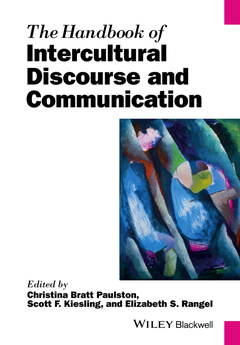The Handbook of Intercultural Discourse and Communication Blackwell Handbooks in Linguistics Series
Coordonnateurs : Paulston Christina Bratt, Kiesling Scott F., Rangel Elizabeth S.

Intercultural discourse and communication is emerging as an important area of research in a highly globalized and connected world, where language and culture contact is frequent and cultural misunderstandings and misconceptions abound. The handbook contains contributions from established scholars and up-and-coming researchers from a range of subfields to survey the theoretical perspectives and applied work in this burgeoning area of linguistics.
This timely volume features first a part that introduces the background detailing the scope and topics of the field; followed by one that describes four different theoretical approaches and their basic research questions, from Ethnography of Speaking and John Gumperz?s Interactional Sociolinguistics to Critical Approaches and Postmodernism. The third part, ?Interactional Discourse Features,? describes and explains the features of talk that are frequently studied in cross-cultural research, such as turn-taking and politeness. The volume also includes a section on Interactional Discourse sites, examining cross-cultural communication (such as Greek-Turkish discourse).
The final part considers a variety of domains in which interaction takes place, such as Translation, Business, Law, Medicine, Education, and Religion.
Preface xv
Introduction xvii
Part I Background 1
1 Intercultural Communication: An Overview 3
Ingrid Piller
2 Perspectives on Intercultural Discourse and Communication 19
Leila Monaghan
3 Cultures and Languages in Contact: Towards a Typology 37
John Edwards
Part II Theoretical Perspectives 61
4 Interactional Sociolinguistics: Perspectives on Intercultural Communication 63
John J. Gumperz and Jenny Cook-Gumperz
5 Ethnography of Speaking 77
Scott F. Kiesling
6 Critical Approaches to Intercultural Discourse and Communication 90
Ryuko Kubota
7 Postmodernism and Intercultural Discourse: World Englishes 110
Suresh Canagarajah
Part III Interactional Discourse Features 133
8 Turn-Taking and Intercultural Discourse and Communication 135
Deborah Tannen
9 Silence 158
Ikuko Nakane
10 Indirectness 180
Michael Lempert
11 Politeness in Intercultural Discourse and Communication 205
Janet Holmes
Part IV Intercultural Discourse Sites 229
12 Anglo–Arab Intercultural Communication 231
Eirlys E. Davies and Abdelali Bentahila
13 Japan/Anglo-American Cross-Cultural Communication 252
Steven Brown, Brenda Hayashi, and Kikue Yamamoto
14 “Those Venezuelans are so easy-going!” National Stereotypes and Self-Representations in Discourse about the Other 272
Lars Fant
15 “Face,” Stereotyping, and Claims of Power: The Greeks and Turks in Interaction 292
Maria Sifianou and Arın Bayraktaroğlu
16 Intercultural Communication and Vocational Language Learning in South Africa: Law and Healthcare 313
Russell H. Kaschula and Pamela Maseko
17 Indigenous–Mestizo Interaction in Mexico 337
Rocío Fuentes
Part V Interactional Domains 365
18 Translation and Intercultural Communication: Bridges and Barriers 367
Eirlys E. Davies
19 Cultural Differences in Business Communication 389
John Hooker
20 Intercultural Communication in the Law 408
Diana Eades
21 Medicine 430
Claudia V. Angelelli
22 Intercultural Discourse and Communication in Education 449
Amanda J. Godley
23 Religion as a Domain of Intercultural Discourse 482
Jonathan M. Watt
Index 496
Christina Bratt Paulston is Professor Emerita of Linguistics at the University of Pittsburgh. She served as chair of the department from 1974 to 1989 and as director of the English Language Institute from 1969 to 1998. Her numerous publications include Intercultural Discourse and Communication: The Essential Readings (Wiley-Blackwell 2005, co-edited with Scott F. Kiesling), Sociolinguistics: The Essential Readings (Blackwell 2003, co-edited with G. Richard Tucker), and Sociolinguistic Perspectives on Bilingual Education (1992).
Scott F. Kiesling is Associate Professor of Linguistics at the University of Pittsburgh. His work includes areas such as language and masculinities, sociolinguistic variation, discourse analysis, ethnicity in Australian English, and Pittsburgh English. His publications include Linguistic Variation and Change (2011) and Intercultural Discourse and Communication: The Essential Readings (Wiley-Blackwell 2005, co-edited with Christina Bratt Paulston). He is probably best known for his article “Dude” (2004), which appeared in the journal American Speech.
Elizabeth S. Rangel is the Research Associate at Learning Research and Development Center (LRDC), a Cognitive Science Research Institute at the University of Pittsburgh. Her research on early elementary language learners has focused on native language phonological interference in the reading acquisition process. Her most recent publications include chapters in the third edition of the International Encyclopedia of Education (2010), and Innovative Learning Environments from the Organization for Economic Co-Operation and Development (2010).
Date de parution : 09-2014
Ouvrage de 560 p.
17.3x24.6 cm
Date de parution : 02-2012
Ouvrage de 552 p.
18x25.4 cm



